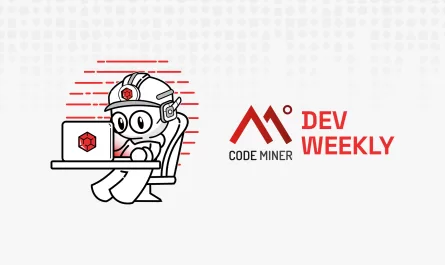HELLO EVERYONE!!! It’s November 14th 2024, and you are reading the 37th edition of the Codeminer42’s tech news report, exceptionally this Thursday, because tomorrow is a National Holiday in Brazil, Proclamation of the Republic. Let’s check out what the tech world showed us this week!
Rails’ Partial Features You (didn’t) Know – by Rails Designer
Partials are an essential element of Rails, simple to understand but with many clever and lesser-known features, warranting a deeper exploration.
How JavaScript’s Temporal Proposal Will Change Date/Time Functions – by Jesse Hall
The article discusses the upcoming JavaScript Temporal proposal, which aims to improve date and time handling in JavaScript. It addresses issues like mutability, confusing month numbering, and limited time zone support. It compares the current Date and Intl approach and emphasizes advantages like integrated formatting, intuitive arithmetic, and type safety.
Node.js Authentication: Best Practices and Key Strategies – by Sushant Rahate
The article present best practices for secure authentication in Node.js applications, emphasizing the importance of safeguarding user credentials, sessions, and account access through various security techniques. It also provides code snippets for implementation and encourages developers to adopt these practices for secure Node.js authentication.
Three Simple Rules to Solve Unsolvable Organizational Problems – by Dennis Persson
This useful article suggests three key rules to improve organizational productivity: focusing on single responsibility, effective communication, and dependency elimination. It suggests assigning clear responsibilities to each employee, reducing multitasking complexity, and encouraging direct communication among team members. Check it out, these tips can improve your teamwork!
Mastering ENUMs in Go – by Tiago Temporin
Tiago Temporin’s article explains how to use enums in Go programming to improve code readability and avoid validation issues. It suggests creating a distinct enum type based on uint8 to prevent conflicts and provides a step-by-step guide on defining enum types, creating constants, and implementing String() methods.
Uber Achieves Significant Storage Savings with MyRocks Differential Backups – by Matt Saunders
Uber has implemented a differential backup system for its distributed databases, reducing storage costs by up to 70%. It reports an average 45% reduction in data storage and faster backup speed. Check out how Uber reached these results!
Do you use Metrics or did you implement Logging and call it a day? – by Benjamin Cane
Benjamin Cane’s article highlights the significance of metrics in an observability strategy, contrasting them with basic logging. Metrics provide insights into application and system performance, including thread usage, system metrics, application events, and business events. Cane argues that metrics offer real-time and historical perspectives with less overhead, providing deeper insights into platforms and products.
North Korean Hackers Target macOS Using Flutter-Embedded Malware – by Ravie Lakshmanan
North Korean hackers have discovered malware embedded in Flutter applications, targeting macOS devices. The malware, disguised as a Minesweeper game, uses Dart programming and is part of a larger campaign involving Golang and Python. The malware, signed with legitimate Apple developer IDs, communicates with a remote server to execute AppleScript code. Check it out! And be safe on the interwebs.
Yes We Need Data, But How Much Exactly – by David Lazar
David Lazar’s article discusses building a chatbot using existing knowledge bases, specifically in infant nutrition. He outlines three main approaches: fine-tuning, prompt engineering, and Retrieval Augmented Generation (RAG). Lazar’s case study highlights the importance of reliable data sources and web scraping. Experiments show a 400 kB knowledge base is necessary for accurate and reliable answers. The article concludes that a larger, quality knowledge base is essential for effective chatbot functionality.
The 5 Cs: Configuring access to backing services – by Brian Grant
Brian Grant’s article discusses the complexities of accessing databases from applications. It outlines three key information types: Coordinates, Credentials, and Configuration. Grant suggests using platforms like Heroku and Kubernetes for automation. He also emphasizes the importance of consent and connectivity for successful service access.
Normalizing a database in Third Normal Form in OutSystems – Ricardo Pereira
Ricardo Pereira’s article discusses the process of normalizing a database to the Third Normal Form (3NF) in OutSystems, emphasizing the importance of a well-structured data model for scalability and efficiency. Following the forms leads to a more robust database design, free of redundancies and properly resolved functional dependencies. It is always good learn the basics of databases.
Monitoring and optimizing website performance – by DebugBear
This useful and recommended article talks about the importance of monitoring and optimizing website performance for user experience, accessibility, search engine rankings, and conversion rates. It also discusses optimizing page rendering, slow web fonts, and long JavaScript tasks. Tools like browser developer tools, PageSpeed Insights, and more are recommended for continuous monitoring.
—
And that’s all for this week! Wish you all a great weekend and happy coding!
We want to work with you. Check out our Services page!



